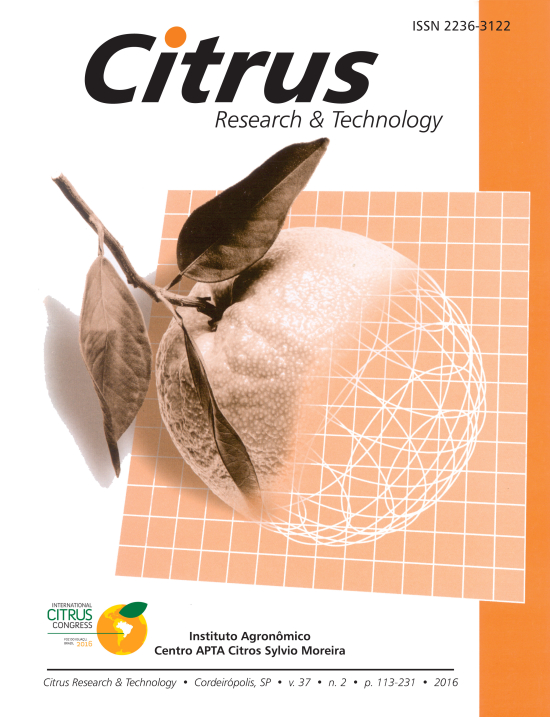Response of Citrus rootstocks to iron deficiency under high pH conditions
Resposta de porta-enxerto de Citrus a deficiência de ferro sob condições de alto pH
Meral Incesu, Turgut Yesiloglu, Onder Tuzcu, Berken Cimen & Bilge Yilmaz
Abstract
Turkey is one of the major citrus producing countries in the Mediterranean Basin. Approximately 90% of the total citrus production in Turkey is carried out in the Mediterranean Region. Soil of the Mediterranean region is calcareous and because sour orange is tolerant to high pH, the rootstocks is widely used in this region. Sour orange rootstock, which is well adapted to calcareous soils, has positive effects on yield and quality, but is extremely sensitive to Citrus Tristeza Virus disease. Because sour orange is very sensitive to tristeza, there is a need to find an alternative rootstock that is well adapted to calcareous soils and has good fruit yield and quality. For this purpose, 16 citrus rootstock and genotypes could be used as a rootstock, were tested against high-pH conditions for iron chlorosis in growth chamber. At the end of this experiment, Tuzcu 891 sour orange, Gou Tou sour orange and Antalya Cleopatra mandarin were the most tolerant; Duncan grapefruit, Tuzcu 31-31 sour orange, Sunki mandarin, Nasnaran mandarin, Cleopatra mandarin x Swingle citrumelo hybrid, Carrizo citrange, C-35 citrange and Marumi kumquat were moderate tolerant; Volkameriana, Swingle citrumelo, Pomeroy trifoliate and Sarawak bintangor were sensitive; and a local trifoliate was found to be the most sensitive to iron chlorosis in a high pH medium.
Keywords
Resumo
A Turquia é um dos principais países produtores de cítricos da Bacia do Mediterrâneo. Aproximadamente 90% da produção total de citros na Turquia é realizada na região do Mediterrâneo. O solo da região do Mediterrâneo é calcário e devido a laranja azeda ser tolerante a condições de alto pH, estes porta-enxertos são amplamente utilizados nesta região. O porta-enxertos de laranja azeda, no qual é se adapta bem aos solos calcários, tem efeitos positivos sobre o rendimento e a qualidade de frutos, mas é extremamente sensível à doença do vírus da tristeza dos citros. Como a laranja azeda é muito sensível à tristeza, é necessário encontrar um porta-enxerto alternativo que seja bem adaptado aos solos calcários e que tenha bons rendimentos e qualidade dos frutos. Para este fim, 16 porta-enxertos e genótipos de citros que poderiam ser usados como porta-enxertos, foram testados em condições de pH elevado para clorose causada pela deficiência de ferro em câmara de crescimento. No final deste experimento, as laranjas azedas Tuzcu 891 e Gou Tou e a tangerina Antalya Cleopatra foram os mais tolerantes; pomelo Duncan, laranja azeda Tuzcu 31-31, tangerina Sunki, tangerina Nasnaran, hibrido entre tangerina Cleopatra x citrumelo Swingle, citrange Carrizo, citrange C-35 e kumquat Marumi foram moderadamente tolerantes; Volkameriano, citrumelo Swingle, trifoliata Pomeroy e tangor Sarawak foram sensíveis; e um trifoliata local foi considerado o mais sensível à clorose de ferro em um meio de pH elevado.

